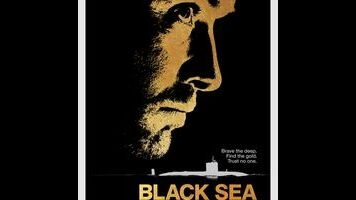For most of its running time, the suspenseful maritime thriller Black Sea takes place aboard an ancient Russian submarine. To call the boat a tin can would be an insult to metal containers everywhere. It’s more of a floating museum exhibit, a rust-coated relic from another lifetime. One can almost smell the huff and puff of diesel as this mechanical leviathan lurches to life, sending a dirty dozen (give or take) of desperate men down into the inky abyss. Submarine movies run on claustrophobic dread, the discomfort of being squeezed inside a narrow, aerodynamic tube and dunked several leagues under. Here, though, the tension mounts before we’re even beneath the waves, with the first glimpse of the monstrous craft. The crew of Das Boot would take one look at the thing and reconsider their duty to the Führer.
The commander of this creaky vessel is Robinson (Jude Law, rocking a Scottish brogue, plus more muscles and less hair than usual). A grizzled ex-British navy officer with lots of underwater experience, he’s the kind of guy who gets accused of being married to the sea—in part, perhaps, because he lost his actual wife to the long hours and high demands of the salvaging industry. Shit-canned by the company to which he gave his best years, Robinson assembles a team of professionals, each member blessed with his own useful skill, all introduced in one of those brisk montages common to heist movies. The one last score: a stockpile of Nazi gold, sealed within a sunken U-boat resting at the bottom of Russian waters.
All that may sound like a recipe for rousing aquatic adventure, but once Black Sea has sent its mismatched characters into the icy drink (“Outside it’s just dark, cold death,” one of them ominously intones), a tougher and more harrowing genre movie begins to take shape. Robinson’s crew is an uneasy blend of British and Russian seamen, divided by language and mutual distrust. They can’t go to the surface under any circumstances, because the Russian navy might spot them. Nor can they use the radio, even in case of emergency. And there are no escape suits. Worse yet, Robinson’s offer to split the bounty evenly among his men has created waves of paranoia. What happens when someone wants a larger share?
Black Sea is populated mostly with stock types, all embodied by a rich, multi-national ensemble of character actors: Ben Mendelsohn as the dangerous hothead, newcomer Bobby Schofield as the wide-eyed rookie, Scoot McNairy as the wimpy American suit out to save his own hide (à la Paul Reiser in Aliens). More than just finding the right people for the roles, the filmmakers smartly generate chemistry through prior co-star pairings: Mendelsohn and McNairy appear on-screen together for the first time since Killing Them Softly, and the movie reunites Grigoriy Dobrygin and Sergey Puskepalis, the leads of the Russian two-hander How I Ended This Summer. Though the characters are at odds, the cast operates in perfect unison.
Shooting on both a real submarine and a soundstage, Macdonald (The Last King Of Scotland) often captures the action in handheld close-up—his typical strategy, appropriately applied to close quarters and seasick men. Because of the film’s fathoms-deep environment, it’s possible to imagine what James Cameron might have done with this brisk, muscular material; surely, the Titanic director would have better defined the contours of the single setting. But Macdonald exhibits a rewarding interest in the mechanics of running a sub—the complicated series of manual-labor tasks and coordinated analog processes required to keep one of these mighty boats afloat. It’s a submarine movie that cares how submarines work.
At its greatest heights (depths?) of anxiety, Black Sea comes across like a seafaring descendant of The Wages Of Fear. There are scenes of nail-biting intensity, as when three divers attempt to carefully maneuver a crucial piece of equipment across a ridge, their life-or-death efforts complicated by a greedy decision. And in casting a veritable suicide mission as the last resort of men robbed of their livelihood, the film gains some of the sharp political dimension of Clouzot’s classic corker. If only Macdonald and his screenwriter had the nerve to take their fatalistic scenario to its logical conclusion. For viewers grooving to the bleak trajectory of the story, the unexpected upshot will feel like a bad case of the bends.











![Rob Reiner's son booked for murder amid homicide investigation [Updated]](https://img.pastemagazine.com/wp-content/avuploads/2025/12/15131025/MixCollage-15-Dec-2025-01-10-PM-9121.jpg)

























![HBO teases new Euphoria, Larry David, and much more in 2026 sizzle reel [Updated]](https://img.pastemagazine.com/wp-content/avuploads/2025/12/12100344/MixCollage-12-Dec-2025-09-56-AM-9137.jpg)



